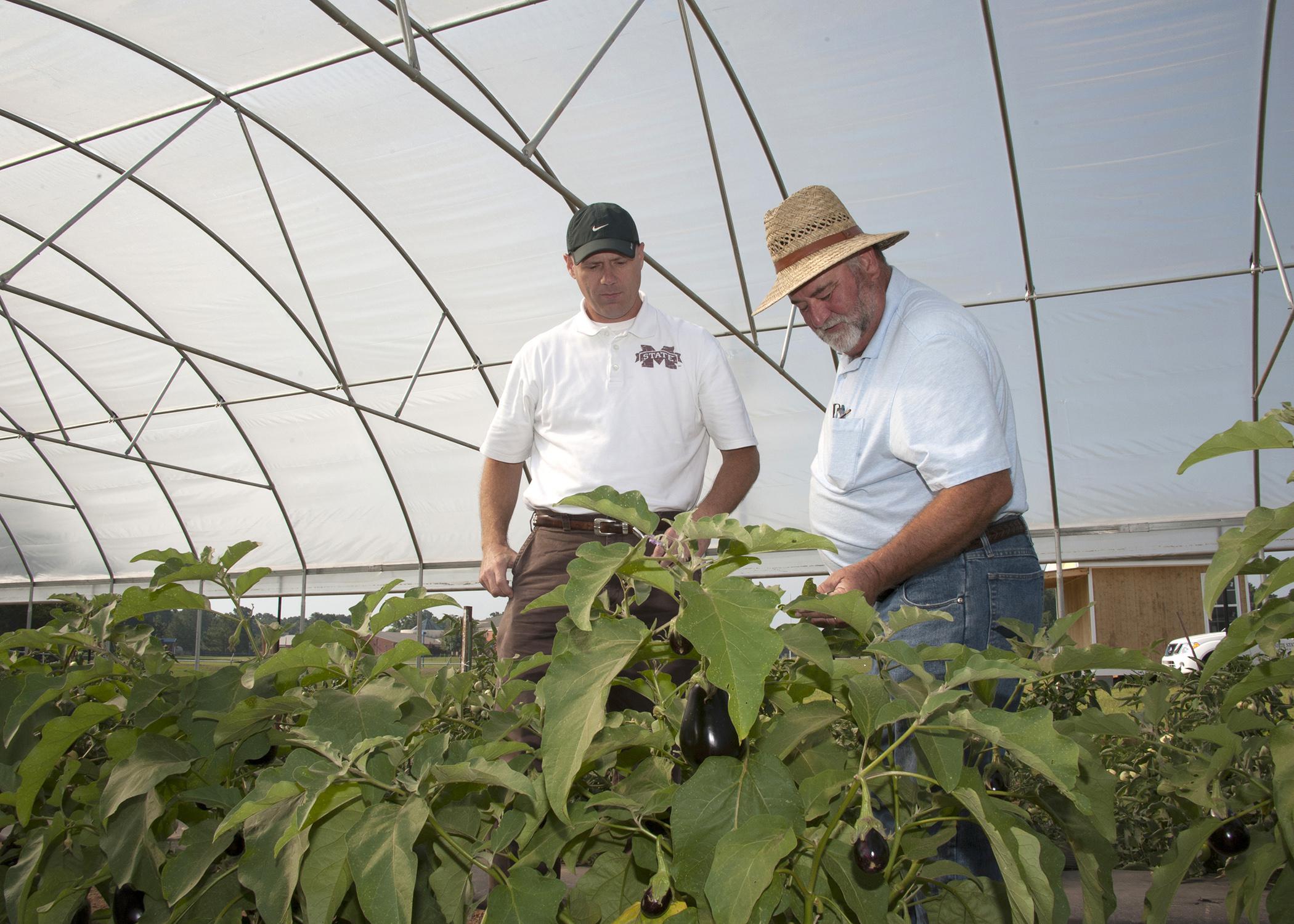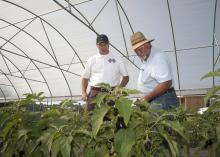Information Possibly Outdated
The information presented on this page was originally released on July 29, 2013. It may not be outdated, but please search our site for more current information. If you plan to quote or reference this information in a publication, please check with the Extension specialist or author before proceeding.
Two MSU alumni growing bright future with tribe
MISSISSIPPI STATE – A partnership between two Mississippi State University alumni and the Mississippi Band of Choctaw Indians is bearing fruit under three hoop houses next to Conehatta Elementary School.
For 10 years, Dick Hoy, Class of 1976, and Jim McAdory, Class of 1998 and an MSU Extension agent for the tribe, have been exchanging tips on agriculture and greenhouse operations. This year, they broke ground on the first of at least three school-based farms designed to teach students about gardening and healthier eating.
“If we can get the kids to eat these blueberries, tomatoes and squash instead of junk food, we’ve been successful,” Hoy said. “The opportunity is too good to miss. They’ll learn how plants grow and how they can grow their own fruits and vegetables. I believe that if we can develop their interest in gardening, they’ll want to eat what they grow.”
Hoy left a 30-year career in the horticulture business to work for the Choctaws' vocational rehabilitation program. Over time, his labors resulted in several greenhouses that provided colorful seasonal plants for the resorts, tribal grounds and schools. Then he expanded the project to grow produce for the restaurants.
As more people within the tribe realized the benefits of eating locally grown foods, Choctaw leaders asked Hoy to lead a project designed to make a difference in tribal members’ health. The result is a new company, Choctaw Fresh Produce.
“About 45 percent of the tribe is diabetic, the highest rate in the country,” Hoy said. “The Oneida Tribe of Indians in Wisconsin saw a significant decrease in diabetes and related amputations when they became ‘food sovereign’ and focused on growing their own food. The tribal leaders here are committed to embracing the positive aspects of agriculture in their heritage to make a difference in the future health of the tribe.”
Hoy said the tribe was able to launch Choctaw Fresh Produce, because of a three-year grant received from the Administration for Native Americans. The tribe’s Office of Economic Development applied for the grant to help cover some of the costs of high tunnels, farming equipment and operating expenses. Economic development officials are already pursuing additional funding opportunities to continue to grow and diversify this new commercial farming operation.
Hoy said that getting young people excited about healthier food choices and gardening is only one part of the hoop house project.
“Our goal is to build 18 high tunnels that are productive on a square-foot basis,” he said. “We already sell at the tribal farmers market, but we want to sell to the schools through the Farm to School program also.”
Based on information gleaned from Extension workshops and his local agent, Hoy and his three-person team employ sound agricultural practices, including a perimeter fence for animal exclusion. They have a food defense plan in place to address potential threats to food safety.
“We’re trying to stay pesticide free and want to be certified naturally grown,” he said. “This first season we’ve experimented with row spacing, different varieties and different types of fruits and vegetables, such as bok choy, which was very popular with the restaurants, and ground cherries, which a lot of people liked but take up too much space to continue to grow in future seasons.”
Hoy relies on Extension agent McAdory for agricultural production strategies, food safety information, soil testing, disease identification and integrated pest management tips.
McAdory also serves as a cheerleader.
“Hoy has been a catalyst for the tribe seeing the potential in agriculture again,” McAdory said. “His proven success with the greenhouses gave them the confidence that food sovereignty could become a reality.”
McAdory said the tribe is looking beyond the 18 grant-funded hoop houses to growing their own chickens, beef and even more produce.
“Agriculture has an established past and a bright future with the tribe, and it’s exciting that the MSU Extension Service gets to be part of the journey,” he said.








